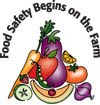
Salmonella, Listeriosis, E. Coli…
Every time another food-borne illness makes the news; a few more people get concerned about the safety of their own food sources. In some ways, this works to the small farmer’s advantage. In some ways, it makes direct marketing slightly more intense.
The historically huge egg recall of 2010 left a lot of folks concerned with eggs from the grocery. Egg sales at the Market have been high ever since. Over the years there have been numerous recalls on ground beef, tomatoes, spinach, green onions and lettuce, among other things. The latest scare with listeriosis in melons has people talking about food safety once again.
With each scare, the nation gets slightly closer to very restrictive regulation. I think at some point folks will ask for more regulation to allay their fear of illness and personal harm. As producers, we need to be aware of this and take some type of proactive measures. As small-scale farmers selling directly to the public, we are on the frontlines. We should all be conversant in the current health concerns. We cannot hope by ignoring the “issues” that they will go away. The public wants reassurance, and as producers with hands-on connection to the food source, we are in the prime position to offer this along with some much needed education.
First, we should educate ourselves and our customers. What is food borne illness? Where does it originate? The obvious answer here is food…but, how do the various types of bacteria enter our food? Are there measures that can be taken to assure safety? For the record, YES, there are!
Next, we would take action on this education. Changes could, and should, be made at the farm level to assure a nutritious product that is safe and fresh. Consumers should care for their food products properly once they have made their purchase and prior to consumption.
To assure that we (as producers) were educated, last winter I enrolled in the GAP’s Program offered online by Cornell University. The FAO of the UN is leaning toward some type of audit/certification program to assure food safety. The New Jersey Department of Agriculture petitioned the USDA to design a course of education. Cornell offered the first such program to educate producers. The Good Agricultural Practices course offered the framework for producers to write a plan of action and granted a certificate of achievement at the end. If nothing else, this certificate looks somewhat impressive hanging on the wall in the farm office.

The whole idea behind the GAPs program is to make producers aware of the consequences of their actions, to get them to maintain some level of accountability, and to enforce this among their workers. Many of the areas of concern seemed to be matters of common sense and good hygiene to me. However, farm practices and personal hygiene vary greatly from operation to operation. Maintaining set standards can be difficult when there are numerous locations, employees with diverse backgrounds, and huge amounts of product.
But, the bottom line of food safety can to be summed up like this….CLEAN water, CLEAN hands, CLEAN food. Simple, huh?

The source of water for irrigation, as well as cleaning, should be clean and potable. The workers’ hands should be clean, or gloves worn in every harvesting/processing situation. These two simple steps go a LONG way in providing safe food for the consumer. Although, this is not to say that any concerns are unnecessary.
If anyone should be concerned about food safety from Homestead Hill Farm…I can assure you that our water supply is tested by VDACS (Virginia Department of Agriculture Consumer Services) on a regular basis.
…and we do wash our hands!
**Disclaimer: Consumers should always follow safe food handling procedures at home. Wash your hands and your veggies! Keep food that needs chilling in the refrigerator.**

A very useful article to read. Thanks a lot for sharing food manager certification minnesota. Fine work. Keep it up.
ReplyDelete